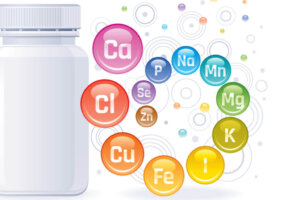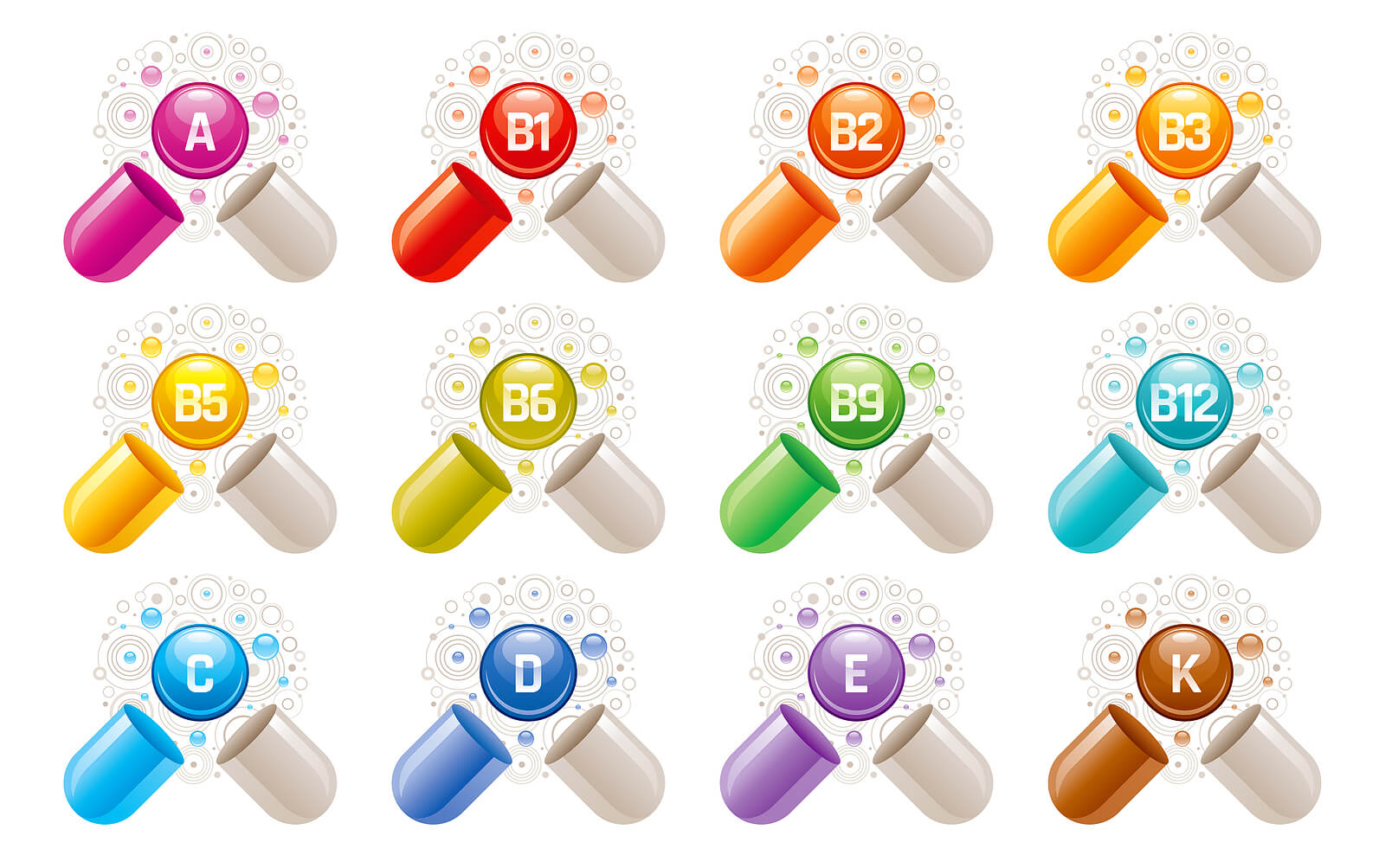What Are Micronutrients?


Escrito y verificado por el nutricionista Saúl Sánchez
Micronutrients are a series of substances found in small proportions in our food. However, this doesn’t mean that they’re unimportant, as they perform essential functions in our bodies.
There are two main types of micronutrients – vitamins and minerals. Most of them have more than one role in the human body. They can act as cofactors, as hormonal precursors, or as modulators of physiological reactions.
Vitamins
This is a group of micronutrients present in food. They can be of two types, depending on how soluble they are. In this way, we can differentiate between fat-soluble and water-soluble vitamins.
Almost all the products we consume contain this type of substance in their composition. However, not every item has them all. Hence the importance of a varied diet that will ensure there won’t be a deficiency in these micronutrients.
Vitamins are grouped as follows: A, group B, C, D, E, and K. Among all of them, vitamin D stands out for being susceptible to appearing at levels lower than those recommended, since it depends to a great extent on exposure to light.
It should also be noted that the liposolubles (A, D, E and K) can be stored within the body in fat. For this reason, they don’t need to be ingested on a daily basis, although this is the most recommended option.
Finally, foods of vegetable origin are those that usually have a greater number of vitamins in their composition. Only vitamin D, characteristic of oily fish, eggs, and enriched dairy products, is the exception. However, there are certain products of animal origin with a high content, such as beef liver with its content in vitamin A.
Functions of vitamins
Vitamins perform several functions within the body. Some of them, such as vitamin C, are involved in the regulation of the immune system, improving its function. This is evidenced by a recent study published in the journal Nutrients. In fact, keeping the levels of this substance within what is recommended can reduce the duration of infectious diseases, such as common colds.
In turn, group B vitamins are characterized by being able to modulate metabolic reactions, from which energy is obtained. However, some of these micronutrients, such as B12, are involved in the transportation of oxygen in the blood, thus helping to prevent the appearance of anemia.
Neither must we forget the functions of the important vitamin D. This micronutrient is capable of influencing the risk of developing complex pathologies, such as those of a cardiovascular type. In fact, supplementation with the vitamin has been shown to reduce the incidence of many of these processes.

Minerals
Minerals are micronutrients that are found in food in small proportions and that usually act as mediators or as catalysts in the body’s reactions. There are several types and sodium, potassium, calcium, iron, zinc and selenium stand out.
They’re present in products of animal and vegetable origin and many times their assimilation is conditioned by the presence of certain vitamins in the food bolus. This is the case of iron and vitamin C, which enhances its absorption.
It should be noted that minerals are susceptible to problems in their metabolism due to interference with other nutrients. Thus, the fiber is capable of blocking the passage of some of these substances into the blood circulation, which conditions their use. Other compounds, such as phytates present in vegetables, may also be capable of preventing proper assimilation.
Mineral functions
Minerals also perform several functions within the human body. Some of them, such as calcium, determine bone density, and are able to reduce the risk of fractures in the long term.
This is relevant in women, since after menopause they suffer a progressive decalcification that can condition their way of life. An appropriate intake of the mineral during all vital stages is beneficial.
Other minerals are closely linked to immune function. This is the case with zinc, a nutrient that has been shown to catalyze the body’s defense reactions and stimulate the production of white blood cells.
Likewise, selenium is capable of acting as a powerful antioxidant, neutralizing the production of free radicals and reducing the risk of premature aging, as well as suffering from chronic pathologies associated with age and inflammation.
How to ensure a correct intake of micronutrients?
Ensuring a correct intake of micronutrients is key from the point of view of dietetics. In this sense, the best recommendation is a varied diet with foods from all groups.
Restricting products usually leads to a greater risk of not meeting the needs of some of the nutrients our body needs. A clear example is the vegan diet, which is lacking in vitamin B12, vitamin D, and iron. It’s necessary to ensure supplementation to allow the success of this type of diet.
However, by preparing a varied menu, all these essential micronutrients can be provided without having to resort to dietary supplements. However, this doesn’t mean that these products don’t have beneficial effects or that they can’t be taken advantage of at a certain time.
Is it good to supplement with micronutrients?
Although some of the more popular supplements, such as multivitamin supplements, aren’t recommended for everyone, certain micronutrient supplements may be beneficial. This is the case with vitamin D, for example.
In the same way, if you suffer from a respiratory system virus, then including a vitamin C supplement in your diet can temporarily help reduce the symptoms and the number of days the disease lasts. The body’s defense function is stimulated and the immune system becomes more efficient.
The supplements of certain minerals have a beneficial function in order to prevent premature aging. This is the case with selenium and its antioxidant power. It could even be positive to supplement this substance with other phytonutrients from foods of the plant kingdom, such as curcumin.

Can you overdose on micronutrients?
It is possible to experience a vitamin or mineral overdose, although this is really unlikely. Fat-soluble micronutrients tend to accumulate in the body, in fatty tissue.
An increase in their dietary intake through the consumption of poorly prescribed supplements could cause them to store more substances than necessary. The consequences of micronutrient overdose are gastrointestinal, with stomach upset, diarrhea, and nausea being common.
It’s also possible to experience an increase in the levels of iron or calcium in the blood, which isn’t usually a concern as long as it doesn’t become a chronic problem. However, it should be noted that these are infrequent situations; you’re more likely to be in deficit than to overdose.
Micronutrients: essential substances
As you’ve seen, micronutrients are essential substances that must be introduced daily through the diet, as the body doesn’t usually have the ability to synthesize them endogenously, except in the case of some vitamins. For this reason, it’s necessary to guarantee the preparation of a varied menu that helps you to prevent deficiencies.
If you suffer from a deficiency in these substances, it’s advisable to go to a specialist to assess supplementation with a product that contains them. This can reverse the side effects of the situation and prevent the development of complex pathologies.
However, some care must be taken with overdoses of micronutrients, as they can cause intestinal discomfort, despite not being frequent. A typical case would be the nausea that’s experienced when consuming multivitamins on an empty stomach.
If you think that your diet may be insufficient in any of these elements, consult a nutrition professional. This will help you to make a guideline suitable to your individual needs.
Micronutrients are a series of substances found in small proportions in our food. However, this doesn’t mean that they’re unimportant, as they perform essential functions in our bodies.
There are two main types of micronutrients – vitamins and minerals. Most of them have more than one role in the human body. They can act as cofactors, as hormonal precursors, or as modulators of physiological reactions.
Vitamins
This is a group of micronutrients present in food. They can be of two types, depending on how soluble they are. In this way, we can differentiate between fat-soluble and water-soluble vitamins.
Almost all the products we consume contain this type of substance in their composition. However, not every item has them all. Hence the importance of a varied diet that will ensure there won’t be a deficiency in these micronutrients.
Vitamins are grouped as follows: A, group B, C, D, E, and K. Among all of them, vitamin D stands out for being susceptible to appearing at levels lower than those recommended, since it depends to a great extent on exposure to light.
It should also be noted that the liposolubles (A, D, E and K) can be stored within the body in fat. For this reason, they don’t need to be ingested on a daily basis, although this is the most recommended option.
Finally, foods of vegetable origin are those that usually have a greater number of vitamins in their composition. Only vitamin D, characteristic of oily fish, eggs, and enriched dairy products, is the exception. However, there are certain products of animal origin with a high content, such as beef liver with its content in vitamin A.
Functions of vitamins
Vitamins perform several functions within the body. Some of them, such as vitamin C, are involved in the regulation of the immune system, improving its function. This is evidenced by a recent study published in the journal Nutrients. In fact, keeping the levels of this substance within what is recommended can reduce the duration of infectious diseases, such as common colds.
In turn, group B vitamins are characterized by being able to modulate metabolic reactions, from which energy is obtained. However, some of these micronutrients, such as B12, are involved in the transportation of oxygen in the blood, thus helping to prevent the appearance of anemia.
Neither must we forget the functions of the important vitamin D. This micronutrient is capable of influencing the risk of developing complex pathologies, such as those of a cardiovascular type. In fact, supplementation with the vitamin has been shown to reduce the incidence of many of these processes.

Minerals
Minerals are micronutrients that are found in food in small proportions and that usually act as mediators or as catalysts in the body’s reactions. There are several types and sodium, potassium, calcium, iron, zinc and selenium stand out.
They’re present in products of animal and vegetable origin and many times their assimilation is conditioned by the presence of certain vitamins in the food bolus. This is the case of iron and vitamin C, which enhances its absorption.
It should be noted that minerals are susceptible to problems in their metabolism due to interference with other nutrients. Thus, the fiber is capable of blocking the passage of some of these substances into the blood circulation, which conditions their use. Other compounds, such as phytates present in vegetables, may also be capable of preventing proper assimilation.
Mineral functions
Minerals also perform several functions within the human body. Some of them, such as calcium, determine bone density, and are able to reduce the risk of fractures in the long term.
This is relevant in women, since after menopause they suffer a progressive decalcification that can condition their way of life. An appropriate intake of the mineral during all vital stages is beneficial.
Other minerals are closely linked to immune function. This is the case with zinc, a nutrient that has been shown to catalyze the body’s defense reactions and stimulate the production of white blood cells.
Likewise, selenium is capable of acting as a powerful antioxidant, neutralizing the production of free radicals and reducing the risk of premature aging, as well as suffering from chronic pathologies associated with age and inflammation.
How to ensure a correct intake of micronutrients?
Ensuring a correct intake of micronutrients is key from the point of view of dietetics. In this sense, the best recommendation is a varied diet with foods from all groups.
Restricting products usually leads to a greater risk of not meeting the needs of some of the nutrients our body needs. A clear example is the vegan diet, which is lacking in vitamin B12, vitamin D, and iron. It’s necessary to ensure supplementation to allow the success of this type of diet.
However, by preparing a varied menu, all these essential micronutrients can be provided without having to resort to dietary supplements. However, this doesn’t mean that these products don’t have beneficial effects or that they can’t be taken advantage of at a certain time.
Is it good to supplement with micronutrients?
Although some of the more popular supplements, such as multivitamin supplements, aren’t recommended for everyone, certain micronutrient supplements may be beneficial. This is the case with vitamin D, for example.
In the same way, if you suffer from a respiratory system virus, then including a vitamin C supplement in your diet can temporarily help reduce the symptoms and the number of days the disease lasts. The body’s defense function is stimulated and the immune system becomes more efficient.
The supplements of certain minerals have a beneficial function in order to prevent premature aging. This is the case with selenium and its antioxidant power. It could even be positive to supplement this substance with other phytonutrients from foods of the plant kingdom, such as curcumin.

Can you overdose on micronutrients?
It is possible to experience a vitamin or mineral overdose, although this is really unlikely. Fat-soluble micronutrients tend to accumulate in the body, in fatty tissue.
An increase in their dietary intake through the consumption of poorly prescribed supplements could cause them to store more substances than necessary. The consequences of micronutrient overdose are gastrointestinal, with stomach upset, diarrhea, and nausea being common.
It’s also possible to experience an increase in the levels of iron or calcium in the blood, which isn’t usually a concern as long as it doesn’t become a chronic problem. However, it should be noted that these are infrequent situations; you’re more likely to be in deficit than to overdose.
Micronutrients: essential substances
As you’ve seen, micronutrients are essential substances that must be introduced daily through the diet, as the body doesn’t usually have the ability to synthesize them endogenously, except in the case of some vitamins. For this reason, it’s necessary to guarantee the preparation of a varied menu that helps you to prevent deficiencies.
If you suffer from a deficiency in these substances, it’s advisable to go to a specialist to assess supplementation with a product that contains them. This can reverse the side effects of the situation and prevent the development of complex pathologies.
However, some care must be taken with overdoses of micronutrients, as they can cause intestinal discomfort, despite not being frequent. A typical case would be the nausea that’s experienced when consuming multivitamins on an empty stomach.
If you think that your diet may be insufficient in any of these elements, consult a nutrition professional. This will help you to make a guideline suitable to your individual needs.
- Carr AC., Maggini S., Vitamin C and immune function. Nutrients, 2017.
- Langan RC., Goodbred AJ., Vitamin B12 deficiency: recognition and management. Am Fam Physician, 2017. 96 (6): 384-389.
- Manson JE., Cook NR., Lee IM., Christen W., et al., Vitamin D supplements and prevention of cancer and cardiovascular disease. N Engl J Med, 2019. 380 (1): 33-44.
- Figueruelo Arnáiz, Víctor. “La Curcumina y sus funciones.” (2014).
- Martínez Domínguez, Beatriz, Mª Ibáñez Gómez, and Francisco Rincón León. “Acido fítico: aspectos nutricionales e implicaciones analíticas.” Archivos latinoamericanos de nutrición 52.3 (2002): 219-231.
- Wessels I., Maywald M., Rink L., Zinc as a gatekeeper of immune function. Nutrients, 2017.
- Cardero Reyes, Yusimy, Rodolfo Sarmiento González, and Ana Selva Capdesuñer. “Importancia del consumo de hierro y vitamina C para la prevención de anemia ferropénica.” Medisan 13.6 (2009): 0-0.
Este texto se ofrece únicamente con propósitos informativos y no reemplaza la consulta con un profesional. Ante dudas, consulta a tu especialista.







